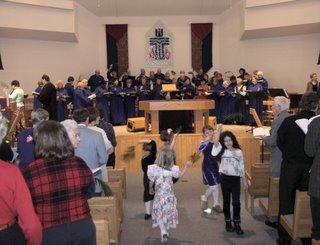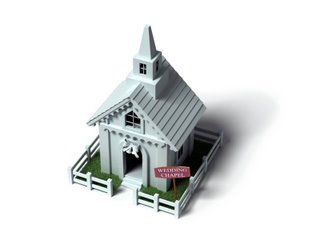
Well, yesterday's blog entry got a couple of interesting comments. It got


me to wondeirng what others might be thinking. One of the things that intrigued me was that both of yesterday's comments were from outside the US. So what do you think? Look at yesterday's post (Religion in America), read the 2 comments and let me hear from you. How do you react to either the article, or the comments. What do you think about the church in America? Which picture best depicts your experience of the American church? I know that none of these is a complete or accurate picture, but honestly, where do you see the state of the church in the United States?

 Well, yesterday's blog entry got a couple of interesting comments. It got
Well, yesterday's blog entry got a couple of interesting comments. It got
 me to wondeirng what others might be thinking. One of the things that intrigued me was that both of yesterday's comments were from outside the US. So what do you think? Look at yesterday's post (Religion in America), read the 2 comments and let me hear from you. How do you react to either the article, or the comments. What do you think about the church in America? Which picture best depicts your experience of the American church? I know that none of these is a complete or accurate picture, but honestly, where do you see the state of the church in the United States?
me to wondeirng what others might be thinking. One of the things that intrigued me was that both of yesterday's comments were from outside the US. So what do you think? Look at yesterday's post (Religion in America), read the 2 comments and let me hear from you. How do you react to either the article, or the comments. What do you think about the church in America? Which picture best depicts your experience of the American church? I know that none of these is a complete or accurate picture, but honestly, where do you see the state of the church in the United States?
4 comments:
This comment is from a missionary friend leading a prayer ministry in Austria:
I just read the blog and the ONLY thing that comes to mind is an analogy that has been used a bazillion times (OK, so that’s not a real number) – anyway “Going into McDonalds doesn’t make me a hamburger.” I don’t even know the point of those kinds of surveys. My heart breaks that anyone thinks that means anything. As an American living overseas and reading the kinds of prayer requests coming out of some ministries, all I am is confused! I love being an American but I get more requests for prayer that make me feel like I am praying for America because she IS RIGHT! Rather than, pray for America that she will be humble before her Lord, listen, and obey.
Here's another comment from a friend in KC.
Our Western culture is very performance based, therefore, we derive much of our identity by what we "religiously" do on the outside; like going to church. TRUE religion is is when the heart of a person is transformed from the inside out; now that's a rare thing!
Juliet Canha/KC,MO
The picture I think describes the church at large is the one with the clock tower in front of the skyscrapers. It seems in a striving effort for relevance, the church has sought to meld into society.
As I pondered this statistic and the accompanying comments for a few days, I realized that the key to this number is in what is said "the survey found that 89 percent of Americans attend a local congregation or affiliate with a denomination. The key to the statement is the "or." Many people will "affiliate" themselves with a denomination because they were confirmed, baptized or any number of other reasons with out actually attending. Therefore this number is an addition of those who say they attend a congregation AND those who are "affiliated" but may have little or no actual participation let alone life change. We are quick to read the statistic, but quickly forget our statistic classes which require us to understand the methodologies of the survey and the actual questions asked as well as the actual correlation of real events to the derived statistics.
To further muddy the waters, Leadership Journal has reported several different figures including that "...researchers Kirk Hadaway and Penny Marler developed a "count-based" estimate of church attendance, using the number of churches in the United States and determining the average attendance at these churches. They arrived at an attendance figure of about 20 percent of U.S. adults." Church Math (Leadership Journal, Summer 2006)
In many ways I wonder if we are not "measuring" the wrong things. Does church attendance really demonstrate commitment to Christ? Maybe, maybe not. Maybe instead we should be concerned with how much is the church affecting society. Maybe we shouldn't worry about the numbers as much as the individual people whom we know. Maybe we should worry if they are connecting with Jesus in a meaningful way. Maybe we should just trust the Lord.
Until we can honestly say that we have introduced everyone to Jesus and each of these people has an honest friendship with Jesus, it really does not matter what the statistics say. Jesus demonstrates this principal with the parable of the Lost Sheep. "The Parable of the Lost Sheep "See that you do not disdain one of these little ones. For I tell you that their angels in heaven always see the face of my Father in heaven. What do you think? If someone owns a hundred sheep and one of them goes astray, will he not leave the ninety-nine on the mountains and go look for the one that went astray? And if he finds it, I tell you the truth, he will rejoice more over it than over the ninety-nine that did not go astray. In the same way, your Father in heaven is not willing that one of these little ones be lost." (Mat 18:10-14) (NET) And so in just the same way that the Father is unwilling for one person to be outside Himself, we too should only "count" to see if there are any missing. Once we have identified who this person is, we search for this person to return them to the Father.
The counting which is done by most of the pollsters is conducted much the same way that David counted the people of Israel in 2 Samuel 24, as a means of assessing political or economic strength. David was judged for trusting in his numerical superiority rather than God. This reliance upon numerical superiority does not allow God to be glorified. God is glorified when He is trusted and His plan is executed His way to His glory.
We should definitely use all tools which we have at our disposal, including statistics, for assessing a situation, but foremost we should seek the Lord's counsel and His wisdom to know how He wants us to act.
On a more personal note, I find my own reaction to this post rather telling. I for the most part concentrated on the academic (statistical side) for justifying why the church is not effecting the society of which it is a part of. I attacked the methodologies of the study as well as found statistics which support another version to the comment "If more people are going to church, and society continues its skid into deeper levels of degradation, then those churches are not having as much impact on society as society is on the church." (Tom Mills, Sept 13, 2006) I was not immediately concerned about the people whom I live with (society) and their disconnection from the Father which this comment speaks to. I was concerned, just as
David was, with "getting the numbers right." I was so quick to rely upon my strength and my plan and not His strength and His plan. Do we ever learn?
Post a Comment